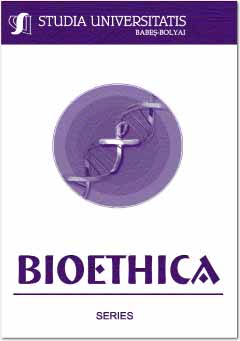ATITUDINI FAŢĂ DE EUTANASIE ÎN FUNCŢIE DE RELIGIOZITATEA ŞI AFILIEREA RELIGIOASĂ DECLARATĂ, LA STUDENŢII MEDICINIŞTI DIN CLUJ-NAPOCA
ATTITUDES TOWARDS EUTHANASIA BY RELIGIOSITY AND RELIGIOUS AFFILIATION IN MEDICAL STUDENTS FROM CLUJ-NAPOCA, ROMANIA
Author(s): Mihai Lupu, Ioan Zanc, Iustin LupuSubject(s): Anthropology
Published by: Studia Universitatis Babes-Bolyai
Keywords: Euthanasia; Assisted suicide; Religious affiliation; Religiosity; Medical students.
Summary/Abstract: Attitudes towards Euthanasia by Religiosity and Religious Affiliation in Medical Students from Cluj-Napoca, Romania. Background. Euthanasia and physician assisted suicide (PAS) are two of the most heavily debated problems in contemporary bioethics, being overcame only by the abortion issue. Some conceptual clarifications are required, because, in the common sense, still persists the confusion between euthanasia and physician assisted suicide, they are sometimes considered as synonymous. The authors of this article show the position of the future doctors, who are studying in Cluj-Napoca, Romania on euthanasia, depending on their religious affiliation and religiosity. Objectives. Our main aim was to study the relationship between euthanasia and PAS, and religiosity and religious affiliation in medical students from Romania and foreign students from English and French sections of the Faculties of General Medicine and Dentistry. Specifically we supposed that religiosity has a deterrent effect on approving euthanasia and PAS. Subjects and methods. We investigated a sample of 192 students from general medicine (130, 68%), and dental medicine (62, 32%), Romanians (62, 32%), French-speaking (60, 31%), and English-speaking (70, 37%). Concerning the religious affiliation of study participants, they are in majority orthodox (53, 27,6%), Roman-catholic (34, 17,71%), atheists (29, 15,1%), Islamic (27, 14,06%), and free-thinkers (24, 12,5%). On this sample we applied the Euthanasia questionnaire, with 17 items with a five points Likert scale, and five dimensions; approval of euthanasia for end-stage patients, positive attitude toward PAS, legal barriers to euthanasia and PAS, the role of palliative care for terminal patients, and approval of euthanasia and PAS for relatives and for himself. Results. The approval of euthanasia and PAS is higher in subjects with lover levels of religiosity and lower for students with orthodox and Islamic religious background. In the meantime, atheists and free-thinkers showed higher level of positive attitudes toward euthanasia and PAS. Foreign students reported higher level of positive attitudes towards euthanasia and PAS in contrast with Romanian students. Conclusions. The subjects with positive attitudes toward euthanasia and PAS reported lower level of practical and spiritual religiosity, confirming in that way the central hypothesis of the study. Generally, higher levels of religiosity exert a protective effect face to the practice of euthanasia and PAS in medical students from the University of Medicine and Pharmacy “Iuliu Haţieganu” of Cluj-Napoca, Romania. As a practical issue we recommend the enhancement of positive attitudes to religion and religiosity in medical students, for better serving their moral vocation of saving life and promoting health.
Journal: Studia Universitatis Babes-Bolyai - Bioethica
- Issue Year: 57/2012
- Issue No: 1
- Page Range: 33-58
- Page Count: 26
- Language: Romanian

